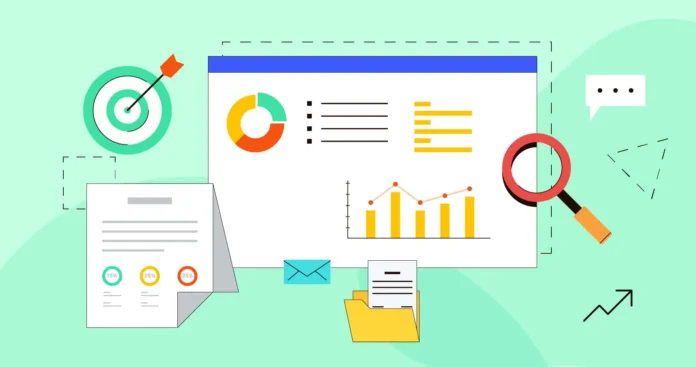Search engine optimization (SEO) is an essential tool for anyone looking to get their content seen online. SEO helps ensure that your website or blog appears higher in search engine rankings, meaning more people will find it and read it.
For beginners, understanding the basics of SEO can be daunting – but it doesn’t have to be! This article will cover everything you need to know about SEO so you can start optimizing your site correctly from day one. Well, discuss topics such as keyword research, link-building strategies, and how to track the success of your efforts.
With this information at hand, you’ll soon become an expert on all things SEO-related! So if youre ready to take control of your online presence and increase visibility for your content then let’s dive right into the world of search engine optimization!
Basics of SEO: Introduction to Search Engine Optimization
Search Engine Optimization (SEO) is an important tool for any website owner. It helps to ensure that your content can be found on the web and get more visibility.
To understand SEO basics, here is a quick introduction to help you get started. Understanding key terms such as crawling, indexing, and ranking is essential when it comes to mastering SEO techniques.
Crawling refers to the process of gathering information about websites from search engines such as Google or Bing, while indexing organizes this data into categories so that they can easily be retrieved by users searching for related topics. Finally, ranking determines how high up in the search engine results pages (SERPs) your content appears; higher rankings mean more visibility and potential customers visiting your site! Creating quality content with relevant keywords also plays an important role in optimizing for SEO success.
Using words and phrases that are frequently searched by users will increase chances of appearing higher in SERP rankings, thus resulting in increased website traffic. Additionally, utilizing social media platforms like Facebook, Twitter,r, or LinkedIn not only allows you to reach out directly to potential clients but also boosts SEO performance due to links being shared across multiple networks – increasing both perplexity and burstiness within your written content!
How to Use Keywords Effectively for Maximum Visibility

When it comes to maximizing visibility for your SEO efforts, keywords are key. Knowing which ones to use and how can make a huge difference in the success of your content.
Here are some tips on effective keyword usage:
1. Research relevant terms – Use keyword research tools like Google Keyword Planner or Answer The Public to understand the different words people use when searching for topics related to yours. You’ll want to focus on long-tail keywords that have lower competition but still provide plenty of search volume.
2. Place keywords strategically – Once you know which words you want to target, place them thoughtfully throughout your content so they feel natural and organic instead of forced or unnatural looking. Aim for one primary keyword per page as well as several secondary phrases sprinkled throughout where appropriate, such as in headings, image alt tags, and meta descriptions.
3. Avoid overstuffing – Too many keywords will be off-putting both from an SEO perspective (Google may penalize you) and from a reader’s perspective (it looks spammy). Focus on quality over quantity; fewer well-placed phrases will work better than many stuffed into every sentence!
4. Update regularly – As trends change online, so do popular search terms; if possible try revisiting old posts with fresh eyes and updating them with new language where relevant– this helps keep content current and up-to-date while also giving you another opportunity for improved ranking potential!
Understanding the Importance of Quality Content Creation
Creating quality content is key to success when it comes to SEO for beginners. Good content must be both engaging and informative, while also including relevant keywords and phrases that help search engines understand the value of your site.
To ensure you create an effective piece of content, there are several important elements to consider. First, think carefully about who your target audience is and what they want or need from the information you provide.
This will enable you to craft a message that resonates with them directly more effectively than if it was written without any thought as to its intended purpose. Second, take some time researching keyword phrases related to the topic at hand; these will help direct readers towards your post via search engine results pages (SERPs).
However, make sure not to overload your article with too many keywords as this could lead Google’s algorithms to flag it up as spammy – something which should always be avoided! Finally, learn how to write for web readers; aim for shorter sentences that draw attention and keep people engaged rather than long-winded paragraphs full of complex language – after all, most users skim-read online articles rather than committing every word to memory! With this in mind try using headings and subheadings throughout the body text wherever possible to to break up ideas into easily digestible chunks without compromising on substance – good luck!
Technical Aspects of SEO and Website Architecture

Understanding the technical aspects of SEO and website architecture is key to getting started with SEO. It requires a basic understanding of coding, such as HTML and CSS, which are used for creating the structure of a website.
Knowing how these elements interact can help you create an effective site that ranks better in search engine results pages (SERPs). Additionally, it is important to understand related concepts like page speed optimization, crawlability, and indexation.
All these considerations are essential when it comes to ensuring your web pages rank well in SERPs. When developing your website architecture there are several principles you need to keep in mind.
This starts by laying out a clear hierarchy between pages – main categories should have their pages while subcategories should be linked from those main category pages. You also need to ensure that all key information is accessible within only three clicks from the homepage.
Furthermore, using internal linking helps Google bots crawl through your content more efficiently so including relevant links within each page is beneficial too! Finally, make sure that all URLs are short yet descriptive so they’re easy for users and crawlers alike to understand what the page contains without having to guess or click through multiple times before arriving at their destination. Altogether this will help optimize your website for both users and search engines alike – resulting in higher rankings on SERPs over time!
Analyzing Your Results with Google Analytics and Other Tools
Understanding how your SEO efforts are performing is essential to success. Fortunately, there are a variety of tools available for analyzing your results.
Google Analytics can be used to track website traffic and monitor the effectiveness of keywords. Other tools such as Bing Webmaster Tools and Alexa Rank Checker allow you to measure trends in search engine rankings and compare them with competitor sites.
By understanding these metrics, you will gain valuable insight into which strategies are working best for you—and what could be improved upon. Additionally, it is important to review user experience on your site by using heat maps or other types of analytics software that provide feedback from users about their experiences navigating through the pages on your site.
This allows you to identify pain points and take steps towards improving those areas so that visitors have an easier time navigating through content on your site. All in all, analyzing the data provided by these tools can give you invaluable insights into where improvements need to be made when it comes to optimizing for SEO success!
Conclusion

Search Engine Optimization (SEO) is an essential tool for any business that wants to get noticed online. The basics are relatively easy to understand, and with the right strategies in place, anyone can start climbing up the ranks of search engines for their chosen topic or niche.
Escort Agency SEO can be especially important when trying to reach a larger audience it’s not enough just to have a website these days; you need to optimize it so that people can find it. Ultimately, by understanding how SEO works and implementing effective tactics, businesses will be able to increase visibility and improve their bottom line.




